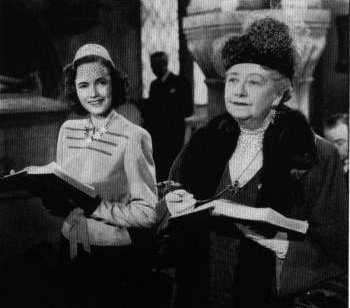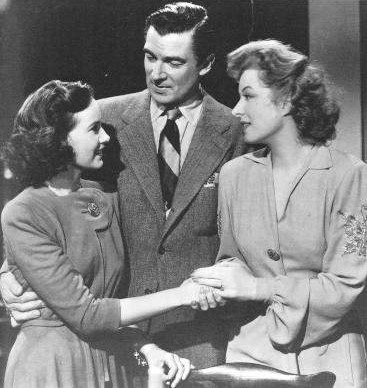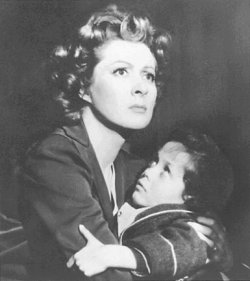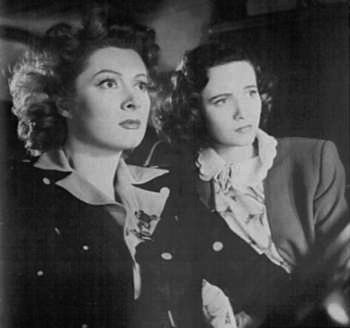





Mrs. Miniver (1942)
Cast | Crew | Awards | Articles | Dialogue | Bibliography | Downloads | Links | Image Credits
| Page 2 |
 Representing the upper class in Belham (a microcosm of English society) are the local matriarch Lady Beldon (played by Dame May Whitty) and her granddaughter Carol (Teresa Wright). Lady Beldon sits in a special, reserved pew in church (at right), orders people about, and complains about middle-class housewives who try to be "better than their betters" and buy things they can't possibly afford. But just as Mrs. Miniver's relationship with Mr. Ballard unites the middle and lower classes in the film, so the romance that develops between Mrs. Miniver's grown son Vin (Richard Ney) and Carol Beldon serves to unite the middle class with the landed aristocracy. Though Carol has a tendency to act self-important and snippy, her relationship with Vin helps cure her of her upper-class affectations while at the same time demonstrating to Vin that his feudalistic preconceptions of her are without foundation. |
 At right, Mrs. Miniver (Garson) and her husband Clem (Walter Pidgeon) welcome Carol Beldon (Wright) into their family upon the announcement of her engagement to their son Vin, a newly commissioned pilot in the Royal Air Force. One of the primary vehicles of MRS. MINIVER's effectiveness is the ironic nature of its script which serves to heighten the film's emotional highs and lows, juxtaposing them and leading the audience to anticipate certain events which either don't happen or are brought about in unexpected ways. For example, in one of my favorite scenes, young Toby demands a proposal from his older brother Vin at the dinner table. |
 In yet another example of emotional juxtaposition in MRS. MINIVER, and one of the film's most potent scenes, Mrs. Miniver reads Lewis Carroll's Alice in Wonderland to her young children, Toby (Christopher Severn, left) and Judy (Clare Sandars), as she puts them to bed in the family bomb shelter before an air raid. After the children are asleep and before the bombs start to fall, Clem and Kay also find a moment to make light of the harrowing situation in which they will soon find themselves, a situation that is quickly becoming routine. His new gas detection screen has become as commonplace a topic of conversation as her knitting needles and the laundry. |
Memorable Quotations:
|
 After the annual flower show (during which the film at last achieves the unification of the upper and lower classes), Mrs. Miniver and Carol (left) drive Vin to the airfield and wait out a tense moment in the car as a dogfight takes place overhead. With her chin high and nostrils flared, Greer Garson came to epitomize the strength of women on the home front during World War II, fighting "the people's war" on their own turf to protect their way of life. |
| Now in Print! |
|---|
| Now on DVD! |
|---|
Buy Videos & DVDs |
|
Buy Movie Posters |
|
Buy Movie Posters |
|
Classic
Movie Merchandise |
|
![]() Printer-friendly version.
Printer-friendly version.
![]() Return
to the top.
Return
to the top.
Last updated:
March 10, 2011.
Reel Classics is a registered trademark of Reel Classics, L.L.C.
© 1997-2011 Reel Classics, L.L.C. All rights reserved. No
copyright is claimed on non-original or licensed material.
Terms of
Use.









